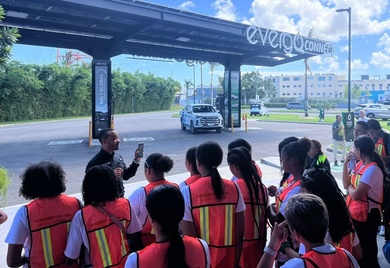Science Dyes in Green Honduras' Textile Industry

If the clothing industry were a country, it would be among the top ten most polluting in the world.
Its supply chains, intensive energy use, and production methods leave a huge carbon footprint.
Some studies show that the production of footwear and clothing generates between 8% and 10% of the total annual global carbon emissions, far exceeding those of aviation and maritime transport combined.
Additionally, estimates show that textile production contributes up to 20% of industrial wastewater pollution, significantly negatively impacting biodiversity.
Many companies and associations are committed to decarbonizing the sector for these reasons.
This requires urgent transformation and greater collaboration across the industry.
Scientific Evidence
Achieving this implies robust frameworks to guide companies in reaching their goals, providing a common, solid, and scientifically-based understanding.
That framework is the Science-Based Targets initiative (SBTi) Corporate Net-Zero Standard, which more than 5,000 companies worldwide have joined.
JOIN A COMMUNITY OF 40,000 DEVELOPMENT LEADERS AND GET THE LATEST ON OUR PROJECTS AND KNOWLEDGE
The standard sets corporate objectives based on scientific evidence to reduce emissions, thus contributing to limiting the global temperature increase to an average of 1.5°C.
IDB Invest has been working with Elcatex in Honduras for several years to support them in designing and adopting such actions and their commitment to sustainability.
For example, they have implemented a gender strategy to increase the number of women-led or women-owned companies in the value chain.
Financing and Advisory
The company transforms natural and artificial fibers (cotton and polyester) through dyeing, finishing, and cutting.
These processes occur in an approximately 55,000 m² plant in the ZIP Tex industrial park, Choloma municipality, Cortés, Honduras.
In August 2022, IDB Invest granted Elcatex and San Juan Textiles a financial package of $40 million.
The financing included $25 million from IDB Invest and $15 million mobilized with the Latin American Export Bank (Bladex).
The objective was to increase production by purchasing and adapting efficient machinery to reduce energy and water consumption per unit produced.
Additionally, IDB Invest provided technical advice to the company on developing a decarbonization strategy, which involved hiring the consulting firm MGM Innova.
Environmental Commitment
In 2023, Elcatex made its commitment to climate change public on the SBTi platform, a pioneer in Honduras and one of the seven textile companies in Latin America.
Achieving net zero means minimizing greenhouse gas emissions from its operations and balancing the emissions that cannot be reduced with carbon absorptions.
WATCH: We Are IDB Invest
The study identified technically feasible actions to implement up to a target year to reach this ambitious goal. In the case of Elcatex, 2030, with 2022 as a baseline.
The strategy has already begun materializing, for example, with the purchase of more than 2 GWh of electricity from the renewable energy company Solar Power Solutions.
With its growth, it projects to acquire up to 5 GWh in the coming years.
Profitability and Sustainability
Regarding thermal energy, 35% of the steam it purchases comes from biomass (palm and coconut residues) from the Renewable Energy Corporation S.A de C.V.
The heat from combustion gases from its operation contributes an additional 48% of steam.
Elcatex also buys from Sula Valley, which employs an anaerobic process to treat wastewater and generates biogas for thermal uses.
They also allied with the Upcycle project, a system that converts textile waste into recycled yarns, avoiding the emission of 1,609 tons of CO2 equivalent per year, compared to obtaining virgin cotton fiber.
Additionally, actions will be taken in its greenhouse gas inventory so that a potential increase in production in response to higher demand in the future does not imply an increase in emissions.
With the support of IDB Invest and the scientific backing of SBTi, Elcatex aspires to demonstrate that profitability and sustainability can go hand in hand, thus establishing a new standard for an industry indebted to the environment.
LIKE WHAT YOU JUST READ?
Subscribe to our mailing list to stay informed on the latest IDB Invest news, blog posts, upcoming events, and to learn more about specific areas of interest.
Subscribe




